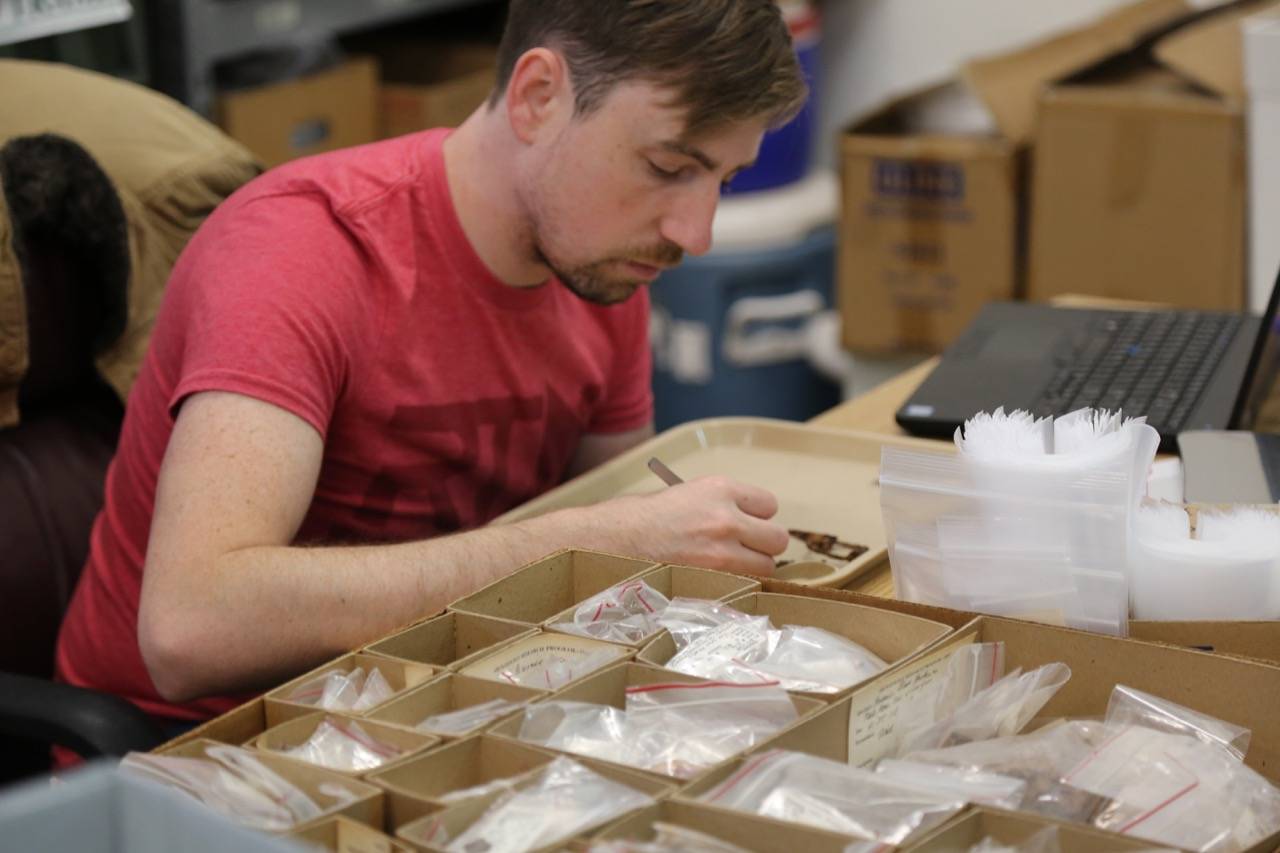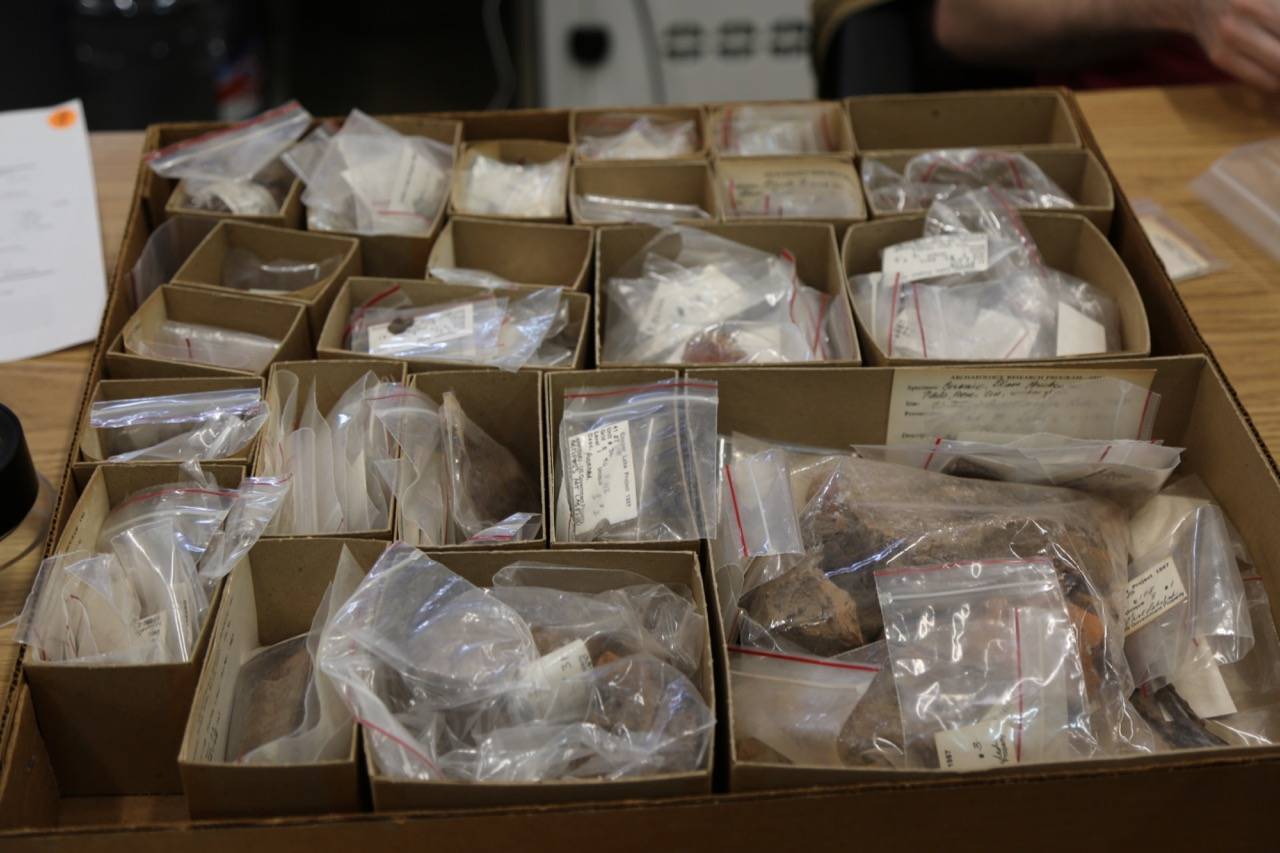Heroes preserving history: Veterans get training, employment working with Center for Archaeological Studies
Julie Cooper | November 9, 2018

Update (10/22/19): Over the summer, the Veterans Curation Program (VCP), geared up a brand-new artifact photography lab and a space designated for archives digitization (equipment funded by the United States Army Corps of Engineers (USACE).
The program also held a graduation ceremony for the first three student Veterans to complete the program at the university’s Center for Archaeological Studies (CAS). The event was attended by CAS staff, University leadership, and other VCP supporters. They were also awarded a new FY20 contract for $225,228 and are in the process of hiring three new student Veterans under this contract.
________________________________________________________________
John Fulbright, a junior anthropology major at Texas State, served in the Army for eight years. Today, he is part of the Veterans Curation Program (VCP) at the university’s Center for Archaeological Studies (CAS).
The program, which is financially supported by the U.S. Army Corps of Engineers (USACE), provides vocational training and temporary employment to veterans. CAS will hire and train students to rehabilitate important artifact and archives collections from the Fort Worth District, USACE.
VCP is a five-month program that was created to process at-risk archaeological collections belonging to the USACE. Started in May, Texas State recently received additional funding to expand the program to a year.
“They made an announcement that the Army Corps of Engineers was looking for veterans to work a program for them. Even though my focus is on cultural anthropology — I gave it a shot and I got it,” Fulbright, 29, said. “Now that I’ve started doing this, I’ve gotten a lot more interested in it. I do want to continue to be in this field, because it is a lot of fun. I’ve been learning an absolute ton since I started.”
Co-worker Clayton Eppler, 25, is a sophomore in the archaeology program. The Marine Corps veteran joined the VCP program in September after seeing an email from the university’s Veterans Alliance.
Fulbright, from Austin, joined the Army right out of high school. He deployed to Afghanistan in 2011-2012. In the service, he was in logistics as a quartermaster. He began working fulltime at CAS in June but is now working part-time hours around his academic schedule. He was recently promoted to assistant lab manager at CAS.
It was CAS curator Amy Reid who made application with VCP to bring the program to Texas State. “I am so excited to give back to those who have sacrificed so much for our country. The VCP is such a great way to prepare veterans for the mainstream job market, especially student veterans who enroll in our university for that very reason.”
The VCP has three flagship lab locations, in Virginia, Georgia and Missouri. Texas State is among the four satellite labs in the country.
The veterans are working to re-house artifacts that have been in storage for many years. Reid explains that the artifacts came from a salvage archaeological project near Lake Lavon in Collin County. The USACE sites are all in Texas and there are prehistoric and historic components to the collections.
“There’s been a little bit of everything (in the collection),” Fulbright said. “There have been nails, shell casings from weapons, horse equipment, clothing, pieces of ceramic, animal bones — and shark teeth.” He said that some of the artifacts have been in an Army warehouse since the 1970s.
Reid is in the process of hiring more veterans for the project, but they do not have to be archaeology majors. “People coming through the program won’t necessarily be looking for jobs in this field,” Reid said. “The skills that they will learn will translate into almost any job out there in the civilian workforce. That’s the goal, to help them with their next step.”

Share this article
For more information, contact University Communications:Jayme Blaschke, 512-245-2555 Sandy Pantlik, 512-245-2922 |